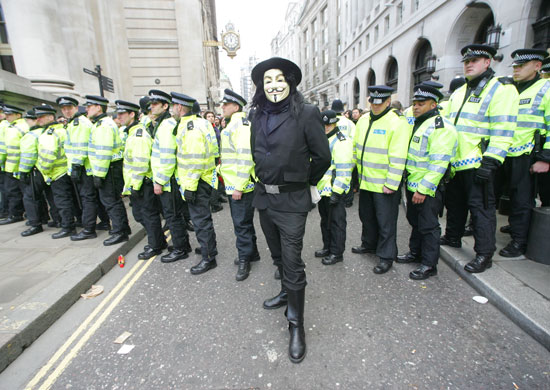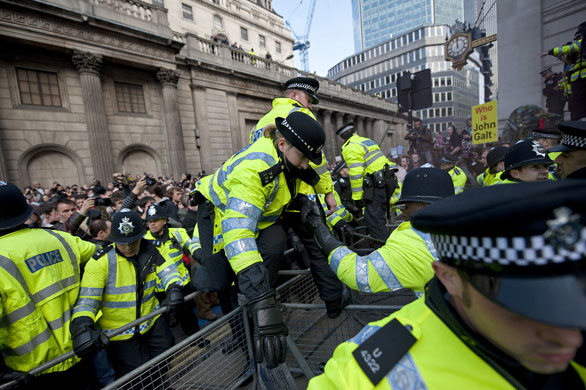 G8 Summits have always been rather inconsequential, and the G20 will no doubt be the same. Maybe they will agree some communiqué stating the need to take urgent action to address the pressing problems of the world. Or maybe they will not. Either way, things will go on pretty much as before. G* communiqués do not have the force of international law, and I do not think that any one of these summits has ever produced a major policy initiative that was subsequently delivered upon. These summits are simply talking shops, occasions for the world's leaders to get together and feel important because of all the other important people they are getting to have chit chat with.
G8 Summits have always been rather inconsequential, and the G20 will no doubt be the same. Maybe they will agree some communiqué stating the need to take urgent action to address the pressing problems of the world. Or maybe they will not. Either way, things will go on pretty much as before. G* communiqués do not have the force of international law, and I do not think that any one of these summits has ever produced a major policy initiative that was subsequently delivered upon. These summits are simply talking shops, occasions for the world's leaders to get together and feel important because of all the other important people they are getting to have chit chat with. One might ask, then, why it is that these summits are taken so seriously. In the case of the media, this is not too surprising. Whatever about the lack of substance to these events, they have a certain razzamatazz. Particularly with the USA having an excitingly charismatic new president, the whole event has the kind of glamour that easily fills column inches or nightly news bulletins. What is perhaps a bit more surprising is the vigour with which various groups take to protesting or trying to disrupt these summits. For some protesters, the media spotlight on the summits is an opportunity to publicise their own demands and proposals. For the more fundamentally anti-system protesters (people who want to, you know, overthrow capitalism and stuff) the payoff is less clear.
In conversation, some anarchists put it to me that their kind of protests serve to delegitimise the summits. I suspect, though, that they have almost the opposite effect. I do not mean that rowdy protests discredit opponents of the summits. Rather, noisy and disruptive protests make these summits appear like more significant events than they actually are. It looks to me like the anti-summit protests feed the egos of the very important people attending the summit, making them feel like their chit chat must be of great moment if people are so eager to protest against it. If the G* summits are simply a spectacular event, then the protesters are just playing their part in the spectacle's reproduction.

a man of wealth (and taste) image source
who is John Galt?
edited to remove dud picture code and associated link

5 comments:
Arguably this summit may well be different - it is obviously the first G20, and the first large-scale gathering attended by the shiny new president, as well as being on a subject close to the hearts of many voters - Gordon Brown would throw half his cabinet in front of a bus to be seen to have had a serious place in turning the economy around. There were after all people saying that nothing would come of Kyoto (yes, yes, get your jokes in now).
Wasn't Kyoto a conference to negotiate climatey stuff, rather than a G* summit? Or maybe it was the only G* summit ever to produce an actual treaty. Maybe.
Unlike other "G*" summits, this one takes place during one of the worst economic crisis in the world's history. Also, this time there's more on the table than just safe, previously agreed themes that could never result in concrete outcomes. By accepting that emerging countries may have a voice, the G8 also accepted the obligation of, if not complying, at least giving an answer to their demands. Before that, they pretty much ignored whatever other nations said, now they still can do it, but it would only cause more problems as they now depend on these emerging nations, especially on China.
Another sensible difference is that previous crisis happened when the world was divided by ideologies that prevented nations from reaching even the smallest agreements; or when the world simply lacked the institutions that can now provide the practical solutions. This time the richest nations agree that they're all profiting from the current status in which nations are more and more dependant on each other, so they decided it will be better for them to concede a little if this helps taking them back to that "virtuous" path they were.
I think the main distinction between this summit and the previous ones is that China has now raised to a "player" level and the G8 nations realized they can’t get out of the mess they brought upon themselves without her help. A couple of other emerging economies will soon follow and accepting them in their exclusive club and acquiescing to their demands would be too degrading for them. So they came up with this more "democratic" G20 model. By doing this, they found a way to comply with China's demands and still look good in the picture.
But let's face the truth, there's very little chance that the palpable outcomes of this summit will be of the same magnitude of a Bretton Woods or even Nixon's abandonment of the gold standard and its consequences. But I still believe that 15, 20 years from now we'll be looking back and recognizing this summit was the beginning of something new.
Ian is right, Kyoto wasn't a G* conference but a UN one. Copenhagen will host an equivalent summit in December.
The extra money given to the IMF would appear to be one significant outcome of the summit. Even given the IMF's history of dealing with financial crises this may help to stave off further financial meltdown in Eastern Europe. Still, whether they needed this summit to allocate these funds is questionable.
In retrospect, this summit might actually have been a somewhat bigger deal than I initially expected. Time will tell.
Post a Comment